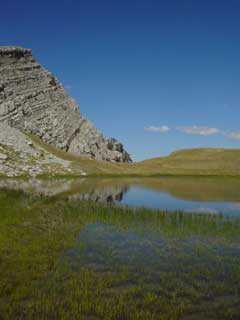 Mediterranean Charter for Water, Rome 1992
Mediterranean Charter for Water, Rome 1992
| Released | 03/03/2006 |
|---|
Mediterranean Charter for Water
The Ministers responsible for Water in the States of the Mediterranean Basin and the representative of the Commission of the European Community meeting in Rome from 28th to 30th October 1992 :
Fully aware of the fact that water resources are of vital importance for man and his environment and can constitute a positive factor in the cooperation among countries while representing an economic good for them all ;
Convinced that, at national and regional levels, water resources form the foundation of a balanced and sustainable economic development;
Aware of the responsibilities of Mediterranean States to ensure rational development of all their water resources in the Mediterranean watershed-whether surface or underground and permanent protection of these resources from all forms of deterioration and pollution ;
Considering that the preparation of long-term national strategies for water resources development is essential for an integrated water management ensuring equitable satisfaction of various requirement and preserving the natural ecological role of water ;
Considering the Genoa Declaration on the Second Decade of the Mediterranean Action Plan (1985), the Declaration of the Algiers Meeting on Water (1990), the Nicosia Charter (1990) and its follow-up at the Cairo Meeting (1992), the Action Programme adopted by the Mar del Plata Conference (1977), the Declaration of the International Conference on Water and Environment of Dublin (1992), the results of the World Conference of Environment and Development in Rio de Janeiro (1992);
Hereby agree to adopt and endeavor to implement the following :
ON WATER PLANNING
1.1. Evaluation of resources
To continue and improve evaluations of all fresh and brackish water resources, in terms of quantity and quality, in order to determine the best possibilities for their mobilization, use and potential re-use through :
· Strengthening of institutions and means for the measurement and collection of information and data;
· Regular inventory and evaluation of available resources;
· Development of techniques for hydrological data collection, processing and storage;
· Improvement of access to data by the various users such as those in charge:
o of the design or operation of hydraulic facilities;
o of assessing the risks of flooding or drought and pollution;
o of evaluation of water resources.
1.2. Evaluations of demand
To continue and improve the quantitative and qualitative evaluation of drinking water requirements of urban, peri-urban and rural population, industrial water requirements and irrigation water requirements, as well as sanitary supplies, suitable low-flow in the river:
· by establishing data banks on water consumption and uses ;
· by regularly updating medium and long term forecasts of water quantity and quality demand.
1.3. Water resources development and management plans
To draw up and implement water resources development plans and projects based on short, medium and long term resources-demand balances, according to a procedure that will be:
· interactive, by organizing dialogue and finding a basis for consensus between policy-makers and water users, at all stages of preparation of development plans ;
· dynamic, by updating quantitative and qualitative data, assessing the results of development plans and tuning them to current requirements.
The water resources development plans will take into account both the benefits for economic and social development and their impact on the environment.
National large water transfer projects within each country may be considered as appropriate means to reduce water shortage specifically for domestic uses within certain parts of the country. The national experiences gained in the Mediterranean area should provide valuable information on this alternative solution for water resources development.
ON WATER MANAGEMENT
By actions at technical, financial, institutional and legislative level, to make best possible use of surface and ground water resources, by preserving their quality and their sustainability and by developing economies in all different uses.
2.1. Technical measures
· with respect to production, conveyance and distribution facilities :
o attenuate the dwindling storage capacities of impounding structures by controlling catchment area erosion and reservoir siltation ;
o reduce losses in irrigation and domestic, industrial water networks and improve their efficiency ;
· with respect to water demand :
o to promote technologies and measures for rationalizing and minimizing water consumption in all sectors ;
o increase water resource potential while reducing pollution at the same time, by recycling industrial water and re-use of treated waste water for irrigation and non-domestic urban uses.
2.2. Economic and financial measures
· establish conditions for an economical and rational use of water and long-term financial viability of the water sector, by setting up tariffing systems allowing cost recovery, including the cost of sewerage and waste water treatment in urban areas, and provision of domestic as well as irrigation water to underprivileged populations ;
· evaluate the advisability of associating the private sector with the management of water resources, in economic, social and financial terms.
2.3. Institutional and legislative measures
· decentralize water management as much as possible to ensure wider participation of users and local institutions ;
· establish or strengthen coordination on a national scale in order to draw up and monitor national strategies for the development and management of water resources ;
· prepare and implement programmes for educating and informing all categories of users, in particular with the support of non-governmental organizations , making them fully aware of their responsibilities , with particular emphasis being placed on improper use of water, waste and pollution, as well as the impact on environment and health;
· improve university, professional and on-the-job training of personnel involved in water resources management by adapting training programmes to the specific features of the Mediterranean (scarcity and vulnerability of resources) ;
· promote legislative and regulatory texts necessary for rational water management and, in particular, protection of these resources from all forms of pollution, and making sure these texts are implemented.
The Ministers and the representative of the Commission of the European Communities agree to encourage cooperation between the countries of the Mediterranean Basin in the area of the management and development of water resources , taking into account the domestic legislation.
ON REGIONAL CO-OPERATION
They agree to promote and organise at regional level :
· information exchange on such aspects as resource and demand assessment, methods and techniques for planning, management and protection of water resources, standards and regulations, tariffing ;
· research and experimentation, especially with regard to the development of non-conventional resources, such as recycling, re-using urban and industrial wastewater and desalinization of brackish and sea water;
· knowledge transfer by training and exchange of experiences, concerted researches for development of new technologies .
They believe it to be worth, in order to successfully implement this cooperation, to create a Mediterranean Water Network.
This co-operation in the water field will be organized consistently and
in connection with on-going Mediterranean programmes such as the
Mediterranean Action Plan. .
ON INTERNATIONAL AND EURO-MEDITERRANEAN CO-OPERATION
They believe that the situation of the environment in the Mediterranean – and specifically of water – is a world challenge and that it is the responsibility of all riparian countries to mobilize the appropriate cooperation means.
They urge in this respect all donors, including those outside the region and the regional and international development and funding institutions to pay particular attention to the water resources issues in their technical and financial assistance programmes.
Within the framework of the existing cooperation instruments or agreements between the European Community and Mediterranean Countries, particular attention shall be devoted to projects specifically dealing with :
· the strengthening of institutions and organizations for water management ;
· the development of national management capacities ;
· the identification and development of approaches appropriate to the Mediterranean context ;
· the adaptation and implementation of standards and regulations ;
· the organisation and circulation of information among countries ;
- the development of partnerships.
Rome, October 1992.
 you are not logged in
you are not logged in





